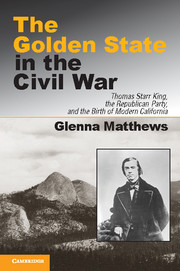 The Golden State in the Civil War
The Golden State in the Civil War Book contents
- Frontmatter
- Contents
- Preface and Acknowledgments
- Introduction
- 1 The Golden State in the 1850s
- 2 Thomas Starr King and the Massachusetts Background for His California Activism
- 3 Toward a Political Realignment
- 4 The First Years of War
- 5 The Military Front
- 6 The Cultural Front
- 7 A New Role for California Gold and a Seesaw Federal–State Relationship
- 8 “Coppery” California
- 9 Californians of Color
- 10 A Tragic Death and Its Aftermath
- Epilogue
- Index
- References
4 - The First Years of War
Published online by Cambridge University Press: 05 April 2012
- Frontmatter
- Contents
- Preface and Acknowledgments
- Introduction
- 1 The Golden State in the 1850s
- 2 Thomas Starr King and the Massachusetts Background for His California Activism
- 3 Toward a Political Realignment
- 4 The First Years of War
- 5 The Military Front
- 6 The Cultural Front
- 7 A New Role for California Gold and a Seesaw Federal–State Relationship
- 8 “Coppery” California
- 9 Californians of Color
- 10 A Tragic Death and Its Aftermath
- Epilogue
- Index
- References
Summary
AN ANXIOUS TIME
In all the Northern states, the period between Lincoln's election and his inauguration on March 4, 1861, was filled with uncertainty about what the future would bring. Southern states began to secede, and no one knew precisely how the new president would react. Would there be armed conflict? If so, how long might it last? Many military officers hailed from the South. To which region would they offer their loyalty? Were any substantial number to side with the South, who would replace them? Once Fort Sumter in Charleston Harbor was forced to surrender in mid-April and the war broke out, many questions lingered.
In California, the anxiety on the part of Unionists must have been especially acute because the state was so new, because its politics had been controlled by pro-South Democrats, and because many prominent men, men such as John B. Weller, governor of California from 1858 to 1860, had spoken of the possibility of an independent Pacific Republic. Indeed, California was the only free state that sent no Republicans to Congress until the election of 1860, an indication of how marginalized the party had been in the Golden State and thus how much reason there was for Unionists to worry about how some of their fellow Californians would accept a Republican president. Finally, and perhaps most alarmingly, the commander of the army's Department of the Pacific, Brigadier General Albert Sidney Johnston, was a Texan. Federal forces in California and Oregon had been separate until James Buchanan had combined them into a united command on November 22, 1860. As discrete entities, they had been led by men known to be fully committed to the Union. As of January 14, 1861, the day he arrived in San Francisco, Brigadier General Johnston was in charge, and his loyalty was suspect.
- Type
- Chapter
- Information
- The Golden State in the Civil WarThomas Starr King, the Republican Party, and the Birth of Modern California, pp. 84 - 105Publisher: Cambridge University PressPrint publication year: 2012


